Author: Jonathan Green
-
Don’t Reform the Honor Code
The current round of dissatisfaction with the BYU honor code will hopefully result in some tinkering around the edges and perhaps a few personnel changes, and then quickly be forgotten before it has a chance to undermine the university’s educational and religious missions, which might roughly be summarized as producing graduates who are educated, productive,…
-

Some tips for your obituary
For some time, I’ve been writing obituaries for a secular educational institution (which, for the sake of the failing hearts of its remaining alumni, will remain anonymous).
-
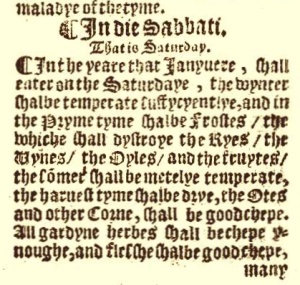
Of early modern English and the Book of Mormon
I don’t think the language usage patterns of the Book of Mormon require the participation of anyone besides Joseph Smith.
-

Come Follow Me for Individuals and Families: A progress report
We still don’t know what to call our family meeting. “Home church” seems to be winning.
-

Why I Wrote a Sex Manual for Mormons
Earthly Parents is the pen name of the author of And It Was Very Good: A Latter-day Saint’s Guide to Lovemaking. He agreed to share some of the book’s background here. * * * On the top of my parent’s bookshelf, far above the white-spined World Book Encyclopedias I read as a child, sat a…
-

This is how you do it
If you want to reach an audience of church members on a sensitive topic, watch and learn from Earthly Parents.
-
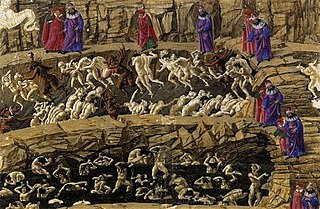
Satan’s troll farm
If Satan hired a Russian troll farm, what would the Mormon corner of the Internet be like?
-

Interfaces of modernity: proselytizing, universities, politics
Avoiding controversy would make our lives easier, but it would not be good for the church.
-

Uto-Aztecan and Semitic: Too much of a good thing
Brian Stubbs’s argument for extensive ancient contact between Semitic and Proto-Uto-Aztecan has received some attention recently in Mormon apologetics, but I don’t think Stubbs’s proposal is going to pan out. First, though, a few important messages.
-
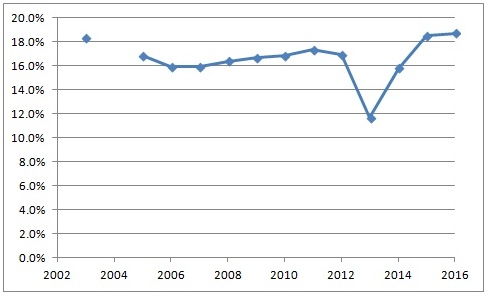
Notes on faculty gender balance at BYU
Michael Austin reported in a 2016 post that women constitute just 11.7% of BYU-Idaho faculty members. This appears to be an error, although the error isn’t Michael’s fault.
-
This is what it looks like when the prophet speaks as a prophet
It is a mistake to apply the heuristics of edge cases to central and paradigmatic examples.
-

Bonsai
In one of the most profound scenes in The Karate Kid—a movie that fortunately has had no sequels or modern remakes, la la la la I can’t hear you—Daniel LaRusso comes upon Mr. Miyagi pruning his bonsai trees.
-
I know this church is true
This statement is not nonsensical or trite. It is the essence of our belief in six words. It is, in its own way, even lyrical. One occasionally hears objections to the effect that statements can be true, or friends can be true, but how can an organization be true? I started writing this post some…
-
The Last 4,000 Years
The last 4,000 years of religious history, up to and resulting in us, can be described as a series of questions and answers, with each new question arising out of the previous answer over generations or centuries as the full implications of each answer become understood.
-

In the world
Is the world a generally wonderful place that is constantly improving and generally better today than it ever has been? Or, to restate the obvious, do we live at peril every hour in a world we must avoid becoming part of, and is this alienation from the world a fundamental part of the message of…
-
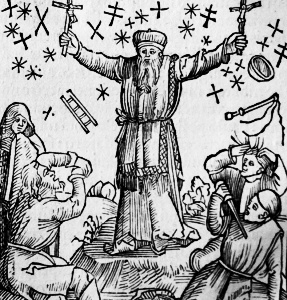
Lutheran Prophets and Mormon Studies
If you spend time browsing a medium-size collection of early modern pamphlets, you’re likely to come across printed reports of a prophet receiving visions, or preaching in one town or another.
-
Loving my Prosperity Gospel
The term “prosperity gospel” describes an execrable set of ideas in American Christianity, chiefly that wealth is a marker of righteousness, and that believers can ensure material wealth and prosperity through spiritual practices. But “prosperity gospel” is often applied to a much broader set of beliefs
-
Fusion
Meeting with my ward high priests group has been one of my favorite parts of the week for several years.
-
Easter Conference
Based on a talk given this Sunday in sacrament meeting. This year, Easter and General Conference are on the same day, which illustrates how we measure time in multiple ways.
-
Stating the Obvious: The World
In the current unhappy state of online Mormon discourse, stating the obvious is sometimes controversial, and for that reason all the more necessary.
-
Moral calculus in the gig economy
What will you do the next time your client drops you into a real-world instance of the prisoner’s dilemma?
-
The two fundamentals of Mormon scripture reading
There are, I think, only two fundamental requirements that a Mormon reading of scripture must fulfill.
-

Onward, Mormon Soldier
Usually I reveal my ignorance gradually over the course of a blog post, perhaps saving the big reveal for the end. This time I’ll get it out of the way up front. I know how spiritual growth and progress toward engagement with the church at an adult level works in lives more or less like…
-

Theorizing the Restoration in the Sixteenth Century
I’ve written before about Sebastian Franck, a spiritualist who charted his own path through the religious turmoil of the Reformation era. As I was recently reading Franck’s letter to the Anabaptist theologian Johann Campanus, I was struck by how familiar Franck’s discussion of apostasy, authority, and restoration sounded.
-
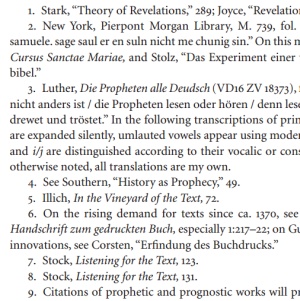
Bad footnotes can be spiritually deadly
Over at Slate, Daniel Engber had an interesting and instructive article a while back entitled “Bad Footnotes Can Be Deadly” on how the current opioid crisis has been aggravated by the misunderstanding of a letter to the editor of a medical journal and its misquotation over decades in the medical literature, with the error propagated…
-
What can LGBT Mormons Hope For? A response
John Gustav-Wrathall asks, “What can LGBT Mormons hope for?” As an answer, John offers his own experience as a guide, and there is much about it that is commendable. Optimism, faith, relying on God, and a commitment to the Church are all far superior to their alternatives, and John’s generosity and positive approach is a…
-
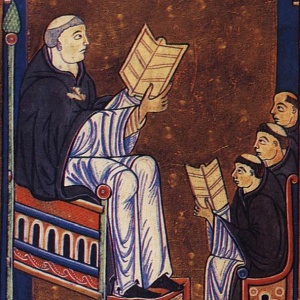
The Hugh of St. Victor option
I have never read Rod Dreher and have no particular insight on how American conservative Christianity should respond to secularism. If Mormons look to medieval clergy for a model of forming intentional communities, however, I think a better option than Benedictine monasticism is that of the Canons Regular.
-
How studying the humanities helps me avoid faith crises: notes on deutero-Isaiah in the Book of Mormon
Clark’s post and his links to David Bokovoy’s discussion of deutero-Isaiah at Rational Faiths reminded me that the dating of Isaiah does not cause me much concern, mostly because I am averse to crises, but also as a direct consequence of my academic studies and research.
